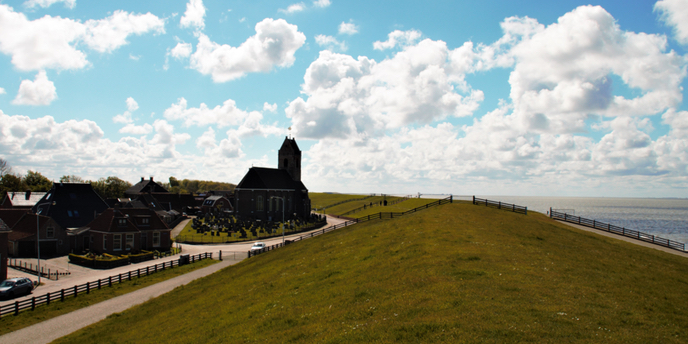Verder dan de dijk
“Als je zegt Waddenzee, dan denk je aan zeehonden en natuur, maar het gebied wordt zelden bekeken door een culturele, historische of maatschappelijke lens,” veronderstelt Karin de Boer, docent en projectcoördinator bij de Bèta Wetenschapswinkel. Dit komt waarschijnlijk omdat de Waddenzee met haar diverse ecosysteem een natuurlijk werelderfgoed is. De plannen voor het Werelderfgoedcentrum Waddenzee in Lauwersoog zijn veelbelovend en interessant voor onderzoekers en studenten van de Rijksuniversiteit Groningen (RuG). Student Science Education and Communication Marjanne van der Bijl onderzocht de potentiële samenwerking tussen Stichting Werelderfgoedcentrum Waddenzee en de RuG door een interdisciplinaire bril, eentje die verder kijkt dan alleen de samenwerking in biologisch vakgebied.

Stichting Werelderfgoedcentrum Waddenzee
“Werken aan een gezonde balans tussen mens en natuur, voor de wereld van morgen”, dat is wat het nieuwe Werelderfgoedcentrum Waddenzee in Lauwersoog volgens de stichting gaat worden. Begin 2022 start naar verwachting de bouw van een centrum waar mensen op de grens tussen land en water, met de handen uit mouwen, het waddengebied kunnen beleven. Het centrum is een interessante plek voor zowel wetenschappers als studenten om samen te komen om het leven op en rondom de Waddenzee te onderzoeken.
Nieuwe perspectieven
Binnen de universiteit vindt er veel meer onderzoek over het Waddengebied plaats dan enkel onderzoek naar de natuur van de Wadden. Marjanne onderzocht voor de Bèta Wetenschapswinkel de potentiële samenwerking tussen de universiteit en het Werelderfgoedcentrum door te praten met wetenschappers uit allerlei verschillende disciplines. “Ik heb juist contact gezocht met onderzoekers uit kennisgebieden die niet per se voor de hand liggen,” vertelt Marjanne. Ze sprak vijftien onderzoekers van onder andere psychologie, geografie, archeologie en geschiedenis om te kijken wat een samenwerking zou kunnen betekenen voor bijvoorbeeld een cultuurhistoricus of archeoloog.
Potentiële samenwerking
Uit het onderzoek bleek dat sommige onderzoekers het lastig vinden dat het waddengebied vaak alleen geassocieerd wordt met natuur. “Het waddengebied reikt verder dan de dijk,” zegt Marjanne, “er is een sociaal-culturele geschiedenis die super interessant is, dus daar mag meer aandacht aan besteed worden.” Het verlangen vanuit de geïnterviewde onderzoekers naar een bredere kijk op onderzoek en onderwijs in het Waddengebied komt overeen met de kijk van de projectorganisatie van het Werelderfgoedcentrum. Zo willen beide partijen dat het centrum een platform wordt voor interdisciplinair onderzoek en onderwijs waar laboratoria en werk-, en ontmoetingsplekken aanwezig zijn.
Het Werelderfgoedcentrum Waddenzee als katalysator
Het centrum kan dienen als regionale brug tussen de RuG en de Waddenregio. Uit de interviews kwam naar voren dat het lastig kan zijn om in contact te komen met organisaties en bedrijven voor onderzoek. Hetzelfde geldt voor het contact met de lokale bevolking. Een centrale plek zou deze drempel kunnen verlagen doordat er een fysieke plek is waar mensen makkelijk naar binnenlopen om samen te overleggen of om informatie uit te wisselen.
Ervaar, Leer, Onderzoek, Ontmoet
Het Werelderfgoedcentrum zal ook een bezoekerscentrum worden, een plek waar bezoekers de Waddenzee beleven door te doen: Ervaar, Leer, Onderzoek en Ontmoet. Hier kunnen bezoekers delen van het onderzoek zelf aanschouwen in de vorm van een zogenaamd ‘living lab’. Op dit moment is het onderzoek gericht op het ecosysteem van de wadden met biologen, ecologen en dierenartsen. De geïnterviewde onderzoekers geven echter aan dat zij ook hier graag een breder beeld zouden zien van het Waddenzee-gebied, eentje die ook het land achter de dijk meerekent en de cultuur die daar leeft. De sociaal-culturele geschiedenis van het gebied heeft namelijk een grote impact gehad op de geschiedenis, ontwikkeling en huidige staat van de Waddenzee. Hoewel beide partijen op veel vlakken met de neuzen dezelfde kant op staan, zou het voor zowel de Stichting Werelderfgoedcentrum Waddenzee als de universiteit bevorderlijk zijn samen te komen om mogelijk samenwerking verder te onderzoeken.
